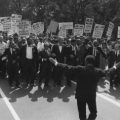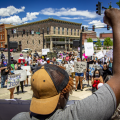
This post was written by Sarah McAfee, a former member of our team.
Early last month, on an exquisite blue sky day in scenic Keystone, Colorado, I found myself thinking about hate. In town for this year’s Colorado Health Symposium, I was moved by a compelling (and highly entertaining) presentation by Sally Kohn, a Fox News contributor, about how hate thrives in our society. She challenged us to see it in ourselves instead of just others, which is the sort of painful introspection that is required for personal growth and bridge-building.
That evening, I found myself in the front row of a darkened room listening to Gregory Mullen, Retired Chief of Police from Charleston, South Carolina, talking about the violence that grows out of hate. He was on duty when a white gunman entered Emanuel African Methodist Episcopal Church and opened fire, killing nine people. And once again, I felt that maybe I didn’t want to look into that darkness, but that perhaps I needed to.
Then there was Charlottesville. From 1,600 miles away, I—we all—watched in horror as the hate that we knew was festering online and in the hearts of some individuals within our communities surged into being, lit up by tiki torches and spewed forth in slurs from the mouths of white people, causing murder and mayhem. It is a hate with many names: racism, bigotry, white supremacy, white nationalism, violent extremism, terrorism, and it is a darkness we must face.
There have already been far more insightful and moving words written about recent events than I can manage, but if there is one thing I’ve learned from my colleagues, my community, my work, and all the things I’ve read, witnessed, and absorbed about how our country got to this place, it is that the silence of those who are unaffected by injustice creates the shadows in which hate flourishes. So I’m speaking out, and I hope you will, too. Even and especially when it’s hard.
At the Symposium, it came up a few times that attendees weren’t sure—as health and health care leaders—that addressing racism and other forms of hate was or should be a part of their work. Let me assure you: it is and it must be. And for the white, heterosexual, cisgender, able-bodied, English-speaking people reading this right now, know that the responsibility is mainly ours to bear. We as individuals may not have built this flawed system, but we did inherit it, and our inaction is complicity. But also know this: you are not alone in this work. The American Public Health Association, American College of Physicians, American Psychological Association, American Medical Association, and the American Academy of Family Physicians have all issued policy statements naming hate crimes as a public health problem. Studies have shown that racism and other forms of discrimination increase depression, suicidal ideation and attempts, blood pressure, heart disease, overall worse health, and even death, so it is very much the responsibility of the health care system to prevent and dispel hate.
The US has a long and well-documented history of oppression, but recent overt demonstrations of hatred are illuminating just how dark the corners of our society have become. Don’t counter hate with more hate—counter it with action. Face the darkness, name it, and together we will drive it out.




